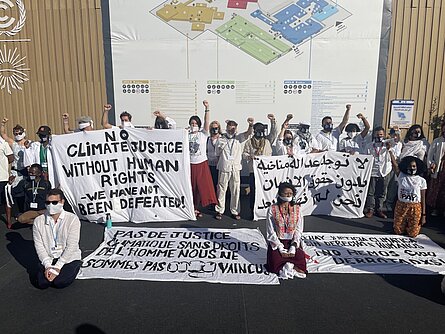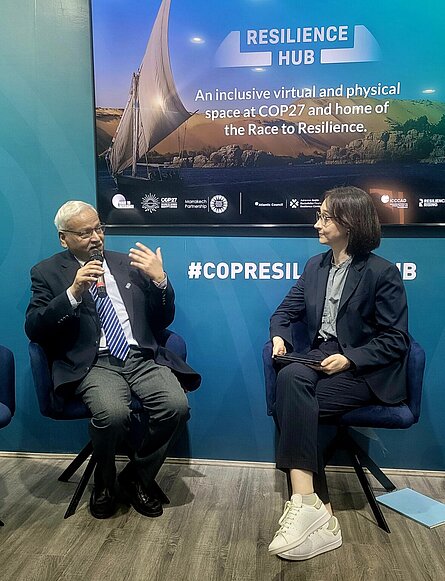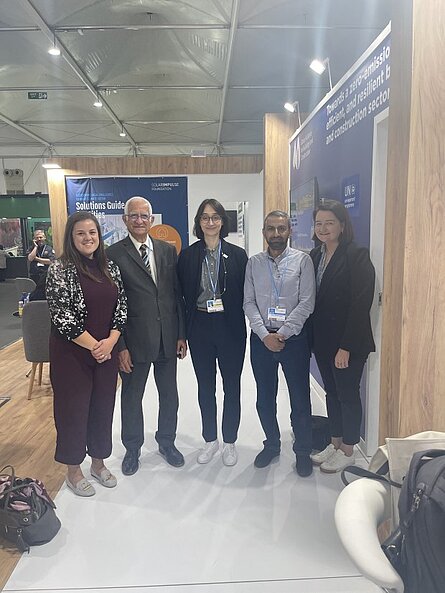People Power: Building Progress at COP27
By Cristina Gamboa, CEO, World Green Building Council
The closure of this year’s Africa COP coincides with my fourth anniversary at the helm of World Green Building Council. It has been an amazing journey as we’ve significantly stepped up our collective impact, advocacy and deepened our collaborations. With 200+ built environment events hosted at Sharm El-Sheikh during the two weeks of this global conference, together we have once again elevated buildings and construction as a critical sector for the transition to a resilient and zero emissions future.
We must keep going. Our sector is still off track to halving emissions by 2030. Recent statistics from the GlobalABC’s Status Report tell us that operational emissions from the built environment increased by 5% last year; and the COP27 final agreement did little to increase the ambitions from Glasgow COP26 in 2021 to reduce overall emissions or limit the use of fossil fuels.
I have lived most of my life in Latin America witnessing the unfairness of climate impacts, biodiversity loss, and gross inequality when it comes to delivering a sustainable and low carbon future. So I was very encouraged to experience this COP as a place of immense “people power”, and the prime global stage to fervently campaign for the decarbonisation of the built environment at speed and scale.

A New Era of Losses and Damages
Hundreds of activists were allowed for the first time to protest within the UN controlled space (the Blue Zone) and with unwavering passion marched and sang for climate justice. The rights and voices of indigenous peoples, women and gender constituencies, people with disabilities, frontline communities, workers, and youth were represented and amplified in civil society spaces.

This necessary pressure and the work of an audacious group of developing countries led to the creation of the funding facility for ‘Loss and Damage’ at COP27. When operational, it will support the most vulnerable developing countries who have suffered, and continue to suffer, from severe weather events caused by high-emitting nations.
As all the countries in the world have signed off on this initiative, it is now, more than ever, in the self-interest of developed countries to cut emissions.
It represents a promising mindset shift. As Professor Salemmul Huq put it: “COP27 has ushered in a new era of shared acknowledgement of the responsibility of human-induced climate change. I believe it would not be wrong to rename it as COP1 due to this historic commitment”.
At COP27 there was also mainstream acceptance and real momentum to reform the architecture of international finance, so that it is fit for purpose in tackling the climate crisis and advancing the Sustainable Development Goals (SDGs). The entire financial sector needs to meaningfully step up to support the most vulnerable, accelerate the clean energy revolution, and drive a rapid decarbonisation of all infrastructure.

The Action Track
Beyond the government negotiations, COPs have an ‘action track’ where we see non-state actors, such as NGOs like WorldGBC, businesses, mayors, governors, scientists and activists come together for real collaboration, accountability, partnerships, commitments and action plans.
Events at COP are a central aspect of the exchanges under this action track. WorldGBC delivered a high-level representation in partnership with the BuildingToCOP Coalition, which collaborates to advance the 5 year plans from the Marrakech Partnership for Global Climate Action led by the High-Level Champions and the legacy Breakthrough Agenda.
Over the two weeks of COP27, the WorldGBC team spoke at 43 of the 200+ built environment related events and were joined by delegates of several of our partner Green Building Councils. We shared existing solutions to advance on energy efficiency, embodied carbon, adaptation, resilience, and nature-based solutions.

My personal highlights were some very powerful sessions on affordable and resilient housing, informal settlements, just transition and human and indigenous communities rights, in partnership with Habitat for Humanity and IHRB.
From left to right: Joan Carling of The Indigenous Peoples Rights International, Megha Nath of ISC, Mary Robinson of The Elders Foundation, John Morrison of IHRB, Cristina Gamboa of World Green Building Council, Barbara Buchner of CPI, Leslie Johnston of the Laudes Foundation, Malin Pettersson-Beckeman of IKEA.

From left to right: Anup Jagwani from IFC – International Finance Corporation, Nicera Wanjiru from SDI. (Slum Dwellers International), Dr. Sunita Purushottam from Mahindra Lifespace Developers Ltd., Cristina Gamboa from World Green Building Council, Ahmed Abdulhakeim from the Egyptian Ministry of Housing, moderator Makoloo Maurice from Habitat for Humanity International.

Importantly, the built environment was prominently visible in conversations relevant to the African and loss and damage context, with new initiatives launched including: Roof Over Our Heads, WorldGBC´s Guide to Climate Resilience and Adaptation in the Built Environment, and the African Alliance for Sustainable Cities and Built Environments.
From left to right: Cristina Gamboa of World Green Building Council, professor Saleemul Huq, Mary Robinson (The Elders Foundation), Sheela Patel, SDI. (Slum Dwellers International), Nigel Topping and Gonzalo Muñoz, UN Climate Change High-Level Champions for COP26 and COP25, respectively.

From left to right: Hastings Chikoko from C40 Cities & WorldGBC Board member; Jacinda Njike – Climate Champions Business Engagement; and Elizabeth Wangeci Chege – Energy Efficiency & Cooling Specialist: SEforALL & WorldGBC Board Member and Chair of Africa Regional Network.

We also profiled key WorldGBC initiatives such as the #BuildingLife project and our Net Zero Carbon Buildings Commitment (NZCB), which is recognised as a delivery partner for the 2030 Breakthrough Agenda for the Built Environment and Race To Zero campaign. The signatories to the NZCB Commitment are at the forefront of the Race To Zero, spearheading industry transformation and the decarbonisation of our built environment, in order to achieve sector breakthrough goals of halving emissions by 2030.
A first ever ‘Urban and Housing Ministerial Session’ on cities and climate change took place at COP27, thanks to the leadership from UNHabitat and ICLEI. The Egyptian Presidency also launched the SURGe initiative (Sustainable Urban Resilience for the Next Generation). The objective is to enhance and accelerate local and urban climate action through multi-level governance, engagement and delivery through five integrated tracks, including building and housing. See a full list of COP27 built environment announcements here.

What’s in store for 2023?
We must leverage the collective will and industry solutions we saw at COP27 to ensure 2023 is the transformative year for our sector in delivering the change needed. As a community of building and construction stakeholders, we are uniquely positioned to ensure that pledges, commitments and promises are turned into action.
1.5ºC is a limit, not a target. We must ensure that 2023 is the year we get the Global Stocktake on emissions right, increase ambition in Nationally Determined Contributions (NDCs) and continue our advocacy.
Global Stocktake
Next years ‘Global Stocktake’ (GST) will see all parties take stock of how they are making collective progress towards the goals of the Paris Agreement. This is an opportunity to gain a comprehensive understanding of the world’s emissions trajectory, identify key gaps, and opportunities to plug those gaps.
At COP27, the UAE Government stated that the success of the GST will depend on the participation of both government and industry, so that the GST is reflective of the reality on the ground.
The outcome of the GST will likely send a strong message on where action is needed. It is key that the government and the private sector are engaged in the process and demonstrating where they can play a role in addressing key gaps.
More ambitious NDCs
Nationally Determined Contributions (NDCs) are essentially action plans countries put forward to outline how they will deliver on the goals of the Paris Agreement. Many countries who have expressed disappointment with the Sharm El-Sheikh Implementation Plan must seize the opportunity to demonstrate their leadership, and update their NDCs with the level of ambition required to keep within the 1.5°C limit. What is currently accounted for in the NDCs if implemented is projected to deliver 2.4°C of global warming.
According to the latest Global Status Report from GlobalABC, only 26% of countries have mandatory codes for the entire buildings sector. Countries must rally around the potential in the built environment and turn in revised NDCs that recognise the power of mandatory building codes in delivering the goals of the Paris Agreement.
Continued advocacy and action
WorldGBC’s advocacy and action will only accelerate in 2023. In particular, we will be focused on helping to deliver on some of the key initiatives announced at COP27, including the call from France and Morocco for Buildings Breakthrough for ‘Near zero emissions and resilient buildings to be the new normal by 2030’.
The ‘Buildings Breakthrough’ follows on from the Breakthrough Agenda launched at COP26. This aims to strengthen international collaboration on the decarbonisation of high-emitting sectors.
WorldGBC’s global policy programme will continue to build momentum with our expansive network of Green Building Councils on the ground, thereby enabling the conditions needed to deliver on the objectives of these key initiatives.

Looking forward to COP28
At WorldGBC we are already looking ahead to COP28, taking place 30 November – 12 December 2023 in Dubai, UAE.
COP26 and COP27 put the built environment back on the global climate agenda. The building and construction sector has shown up and demonstrated that the hard work has been done – the solutions already exist to decarbonise and create equitable, resilient built environments – we just need to continue on with determination to scale.
At the Emirates Climate Conference COP28, ‘The Inclusive COP’, we expect the action track to continue to be prominent and produce rapid change, as businesses and investors move from commitments to actions, possibly outpacing the official process. It will be a year of global advocacy to push governments to turn up with greater ambition than ever.
We call on the UAE government to showcase their commitment and determination to deliver the transformative change needed by including in the official programme a dedicated Sustainable Buildings for Sustainable Cities Day at COP28.
